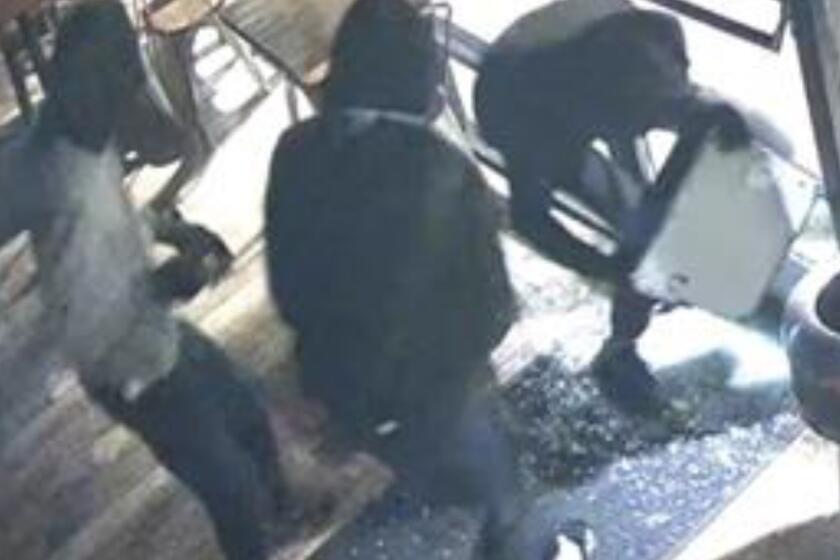Ex-Wife Loses Big in This Game of Chance
During his 25 years of marriage, Thomas Rossi never saw a marriage counselor, never strayed and never doubted a relationship so close that he shared an electric toothbrush with his wife, he said.
Then Denise Rossi shocked him by demanding a divorce. And she wanted it in a hurry.
Now he knows why: On Dec. 28, 1996--just 11 days before she filed for divorce--Denise Rossi won $1.3 million in the California Lottery.
She told no one in her divorce case, and Monday her secret caught up with her. A Los Angeles family court judge ruled that she had violated state asset disclosure laws and awarded her lottery winnings to her ex-husband. Every penny.
Superior Court Judge Richard Denner determined that she acted out of fraud or malice. He based his decision on a deposition in which Denise Rossi admitted that she concealed her winnings because she didn’t want her ex-husband “getting his hands on” them.
“Moral of story: It pays to be honest from the beginning,” said Marc Lerner, attorney for the 65-year-old jilted husband.
Lerner said tears rolled from his client’s eyes when Denner announced his ruling in court. For her part, Denise Rossi, 49, said she was stunned and is contemplating her next legal move.
“Yes, there will be an appeal,” said her attorney, Connolly K. Oyler of Santa Monica. He called the judge’s ruling “very punitive.”
But Thomas Rossi’s lawyers say they are hearing it described another way: karma.
“Maybe people will think twice about hiding assets during a dissolution,” said Lerner, of Brentwood.
Thomas Rossi could not be reached for comment Tuesday, but he weaves a compelling tale in his court papers. Before their divorce--and the fateful Lotto windfall--the Rossis were “a couple of homebodies” from the Westside who did everything together, he said.
“We shared the same bathroom, and we even shared the same electric toothbrush,” he said in court papers.
Denise, however, tells a different story in her filings and an interview Tuesday. She said she had been unhappy for many years and was looking for a way out. He was always broke, and she was always working, she said.
Her chance came when she and five co-workers in a now-defunct clothing design firm pooled resources to play the lottery and hit the jackpot, sharing $6.6 million, she said.
“I’d wanted to get out of this relationship for years,” she said in a telephone interview. She credits luck for her lottery windfall and blames her ignorance of the law for her failure to disclose the winnings.
She had her husband served with divorce papers at the little West Hollywood shop where he developed film and shot portraits of aspiring actors.
His business folded, and he declared bankruptcy in 1998. He went to work part time at a chain photo store.
Then fate struck. More than two years after the divorce, a misdirected piece of mail landed in Thomas Rossi’s mailbox. It was a solicitation addressed to his ex-wife from a company that pays lump sums for lottery winnings and big legal awards.
The May 7 letter from Statewide Funding said, in part, that the company had “helped hundreds of lottery winners like you around the country receive a lump sum payment for the present value of their future annual lottery payments.”
What lottery payments?
“I think he scratched his head for a while, saying: ‘What? This can’t be,’ ” attorney Lerner said.
The California State Lottery Commission confirmed in July that Rossi’s ex-wife had won $1,336,000--payable in 20 annual installments of $66,800.
Thomas Rossi learned that Denise went so far as to have the lottery checks sent to her mother’s address in Pleasant Hill in Northern California.
He obtained a court injunction a few days later. He said his shaky finances in the aftermath of the divorce made his former wife’s secret “even more despicable.” Had she disclosed the winnings, he would have received half under California’s community property laws.
Fighting to hold on to her winnings, Denise Rossi told the court that the lottery ticket had been a gift from a co-worker. The judge didn’t buy it.
Oyler, her attorney, said he might have had a chance during the divorce to help her keep the winnings--if she had only told him about them at the time.
“I could have argued successfully that it was her separate property,” he said. “Or we could have argued and we would have reached some adjustment. But the judge got mad and gave it all to him.”
More to Read
Start your day right
Sign up for Essential California for news, features and recommendations from the L.A. Times and beyond in your inbox six days a week.
You may occasionally receive promotional content from the Los Angeles Times.






